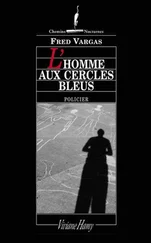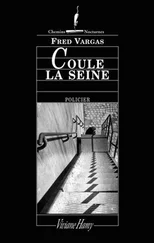The old woman was going to unsettle Adamsberg soon, something that happened only rarely. Not that her questions embarrassed him. They were perfectly ordinary questions. He just found that everything about her made him uncomfortable: her clothes, her pinched lips, her hands in gloves so as not to smudge the slides, her weird bursts of conversation. If Mathilde was kind enough to rescue Clémence from her troubles, that was fine. But he didn’t want to be involved. He had the information he had come for, that would do. He withdrew, muttering a few polite words so as not to hurt her feelings.
Taking his time, Adamsberg looked up the address and phone number of Réal Louvenel. A male voice, strident and highly strung, replied that he could see him that afternoon.
Réal Louvenel’s house did indeed stink of dog. He was a man constantly in motion, so completely unable to sit for long in a chair that Adamsberg wondered how he managed to write anything at all. He found out afterwards that the philosopher dictated his books. Although he replied quite willingly to Adamsberg’s questions, Louvenel was doing half a dozen other things at the same time: emptying an ashtray, putting papers in the bin, blowing his nose, whistling to one of the dogs, strumming on the piano, doing up his belt another notch, sitting down, getting up again, closing the window, stroking the arm of his chair. A fly wouldn’t have been able to keep up with him, still less Adamsberg.
Adapting as best he could to this exhausting nervous energy, Adamsberg tried to register the information that emerged from Louvenel’s complex sentences, making strenuous efforts not to let himself be distracted by the sight of the philosopher as he ricocheted off all the surfaces of the room, or by the hundreds of photographs pinned to the walls, mostly representing litters of Labradors, or youths in a state of undress. He understood Louvenel to say that Mathilde would have been more eminent and a deeper thinker if she didn’t always allow her instincts to distract her from her original projects, and that they had known each other since their university days, when they’d sat together at lectures. Then he said that during the evening at the Dodin Bouffant she’d had a bit too much to drink, and had caused a sensation among the customers by saying that she and the chalk circle man were big pals, that only she and he understood anything about the ‘metaphorical renaissance of the pavement as a new field of scientific endeavour’. She had also announced that the wine was excellent and that she would like another glass, that she had dedicated her latest book to the chalk circle man, that his identity was no mystery to her, but that this man’s painful existence would remain a secret, a ‘Mathildism’. As it might be an ‘esoterism’. A ‘Mathildism’ was something she would tell nobody else about, though in any case it was of no intrinsic interest.
‘Since I couldn’t stop the flow, I left without hearing the end,’ Louvenel concluded. ‘I find Mathilde embarrassing when she’s had a few drinks. She gets boring, talkative, trying as hard as she can to get everyone to love her. Don’t ever let her start drinking when you’re with her.’
‘Did anyone else in the café seem particularly interested in what she was saying?’
‘I seem to recall that people were laughing.’
‘But why do you think Mathilde follows people in the street?’
‘The short answer could be that she collects oddities,’ said Louvenel, fiddling with the creases in his trousers and then with his socks. ‘You could say that these people she preys on are like her fish, she spots them in the street, she chases after them, then she pigeonholes them. But really it’s the opposite. Mathilde’s problem is that she’d be perfectly capable of going and living alone under the sea. Yes, she’s made it her life’s work, she’s a tireless researcher and a distinguished scientist, but all that means very little to her. The real draw is the territory she’s found for herself, underwater. Mathilde is the only deep-sea specialist I know who won’t let anyone accompany her – which is actually very dangerous. “I want to be afraid of everything, and understand everything for myself, Réal, and to go down when I feel like it into a deep trench, into the origins of the Earth.” That’s how she is. Mathilde is a piece of the universe. Since she can’t dissolve into it, she’s made up her mind to study it, so as to grasp its hugest physical dimensions. But the ocean takes her away from human society, and she realises that. Because she’s also got a big slice of good-heartedness, or generosity if you like, that can’t be satisfied with the underwater life. So at regular intervals she comes back to the surface, and gives in to the other temptation, the one that draws her to people, I mean people, not humanity. So she makes her peace with all the millions of little steps people take as they tread the Earth’s crust. She takes everything to extremes, and every scrap of behaviour she can capture, wherever it is, seems a miracle to her. She memorises it all, she notes it all, she “Mathildises” it all. And she picks up lovers along the way, because she’s quite capable of love. And then when she’s tired of all that, when she thinks she has loved her fellow creatures enough, she goes diving again. That’s why she follows strangers in the street. To get a kick out of the flicker of someone’s eyelids or the twist of an elbow, before she goes off again to defy the immensity of the universe on her own.’
‘And what about you? Does the chalk circle man suggest anything to you?’
‘Don’t think I’m being arrogant, but I’m not interested in such infantile things. Even murder I consider infantile. Child-adults bore me, they’re cannibals. They’re fit only to feed off other people’s vitality. They can’t perceive themselves. And because they can’t perceive themselves, they can’t live unaided, they’re greedy for the sight and the blood of other people. Since they have no self-perception, they bore me. You may know that it is man’s self-perception that interests me – note that I’m saying perception, sensation, not understanding, or analysis – more than all other human approaches, even if I live from day-to-day expedients like everyone else. That’s all I can say about the chalk circle man and his murder, about which I know next to nothing anyway, except that Mathilde talks about him a good deal too much.’
Réal was retying his shoelaces as he spoke.
Adamsberg sensed that Réal Louvenel had made an effort to adapt his way of speaking to his interlocutor. He didn’t feel annoyed with him. As it was, he couldn’t be sure that he had exactly understood what this excitable man had meant by self-perception, which was clearly a key word for him. But while listening to the philosopher he had started to think about himself, inevitably – as did everyone else, no doubt. And he had felt that while being unable to observe himself, he did indeed ‘perceive himself’, perhaps in precisely the way Louvenel meant, if only because he sometimes felt ‘uncomfortable at being conscious’. He knew that this perception of one’s own existence could take underground paths, where one’s boots became embedded in mud, and where no answer was forthcoming, and that one needed physical courage not to dismiss it all from one’s mind and get rid of it. But he didn’t dismiss the feeling when it came over him, since it was a moment when he felt quite sure that to do so would doom him to being nothing at all.
At any rate, the chalk circle man didn’t seem to be worrying anyone else. But Adamsberg was untroubled that nobody else was willing to accompany him in his apprehension. That was his own business. He left Louvenel to his fidgety movements, which had calmed down considerably once he had taken a small yellow tablet. Adamsberg deeply distrusted all medicines, and preferred to drag himself round with a high temperature all day rather than take any kind of pill. His little sister had told him that it was very presumptuous always to hope that he would come through it on his own, and that nobody had yet lost their identity by taking an aspirin. His little sister could be a pain sometimes, you wouldn’t believe.
Читать дальше












